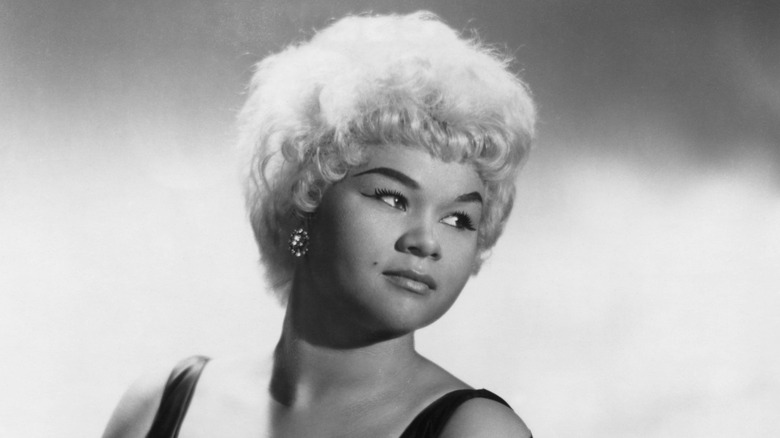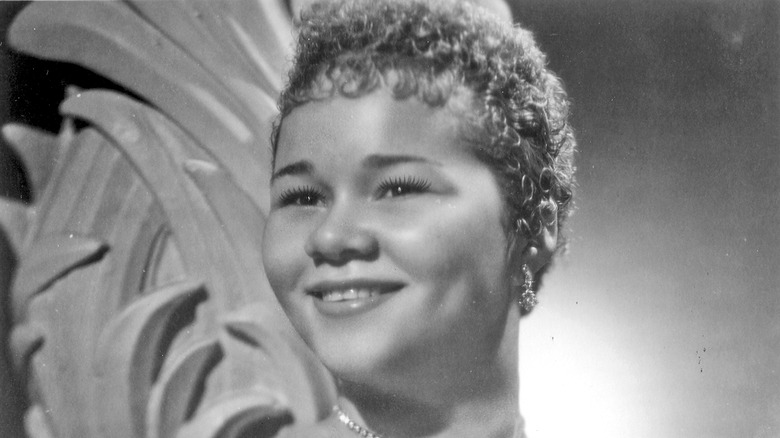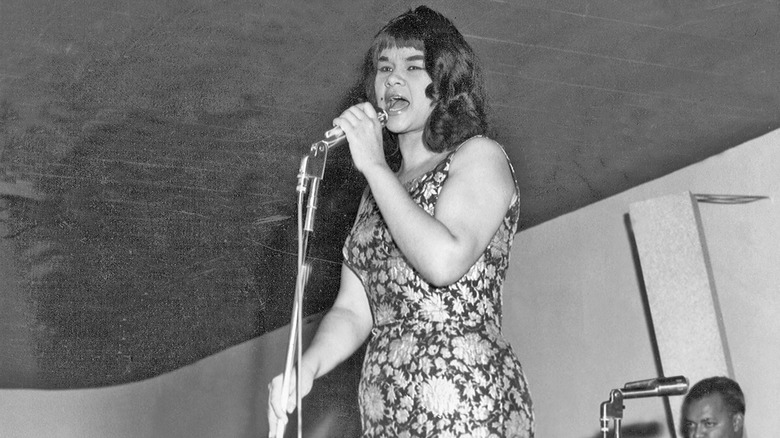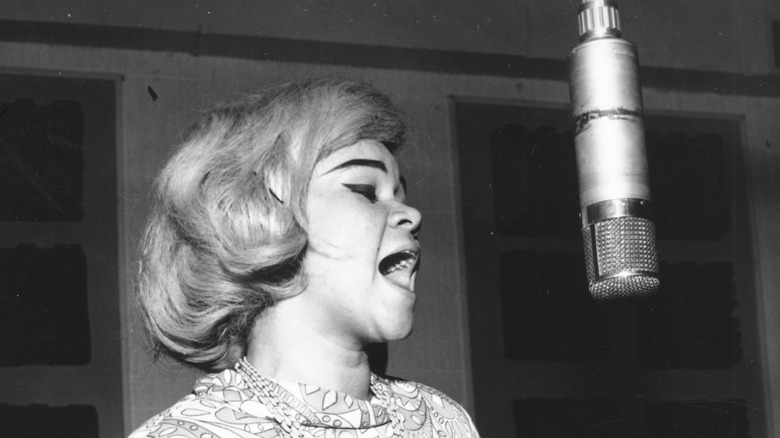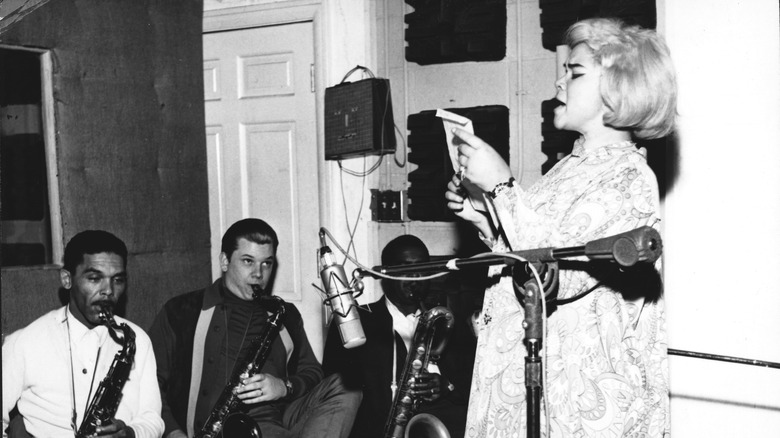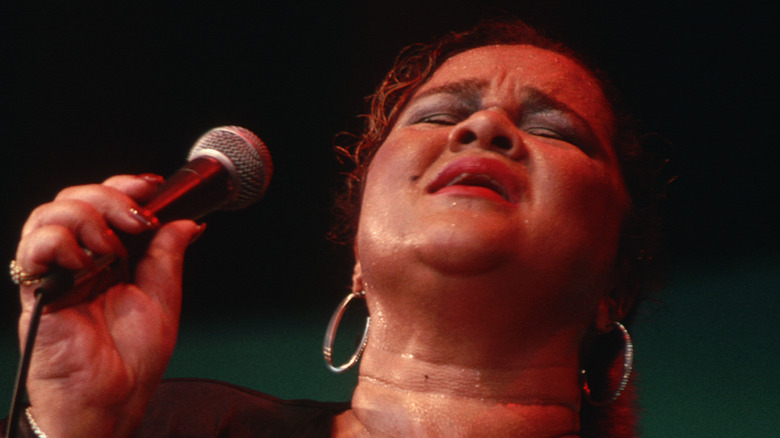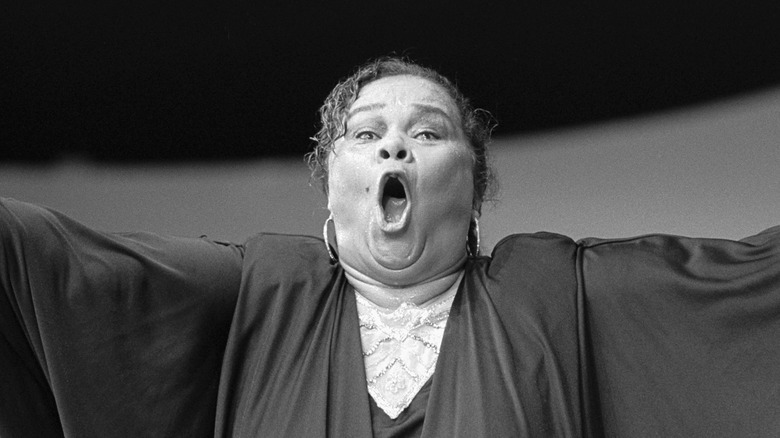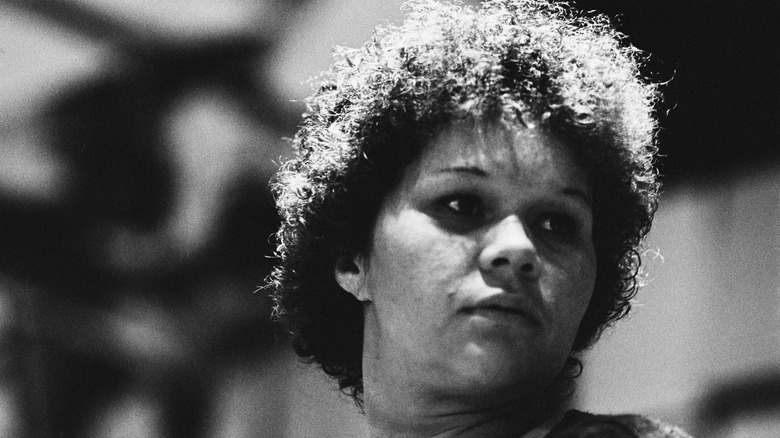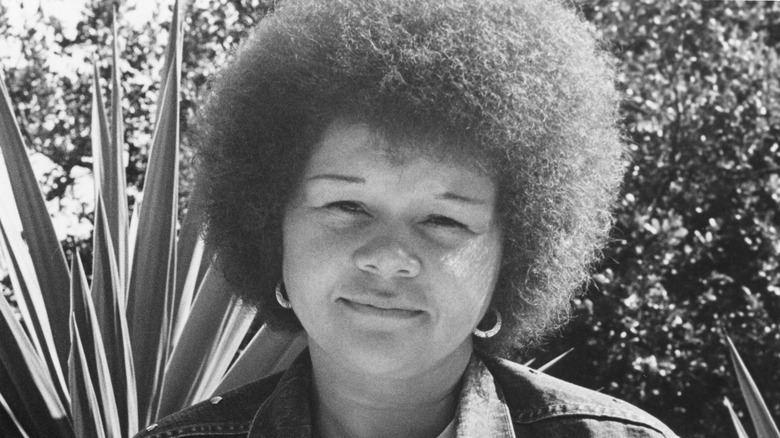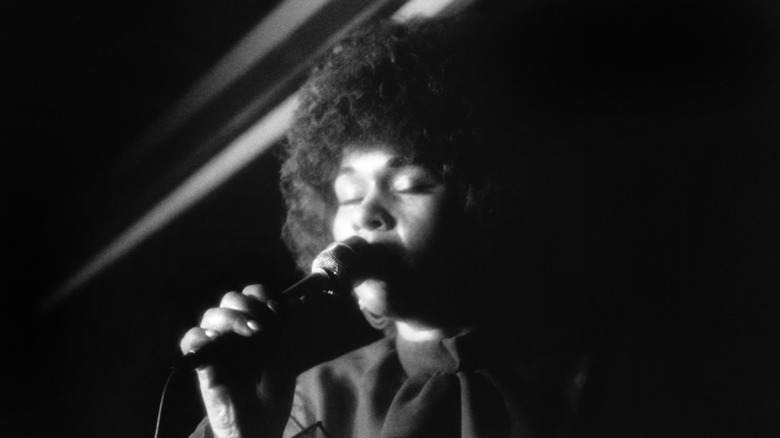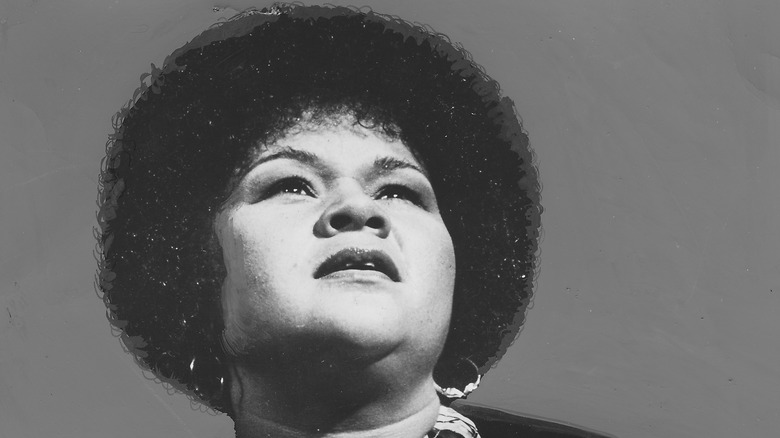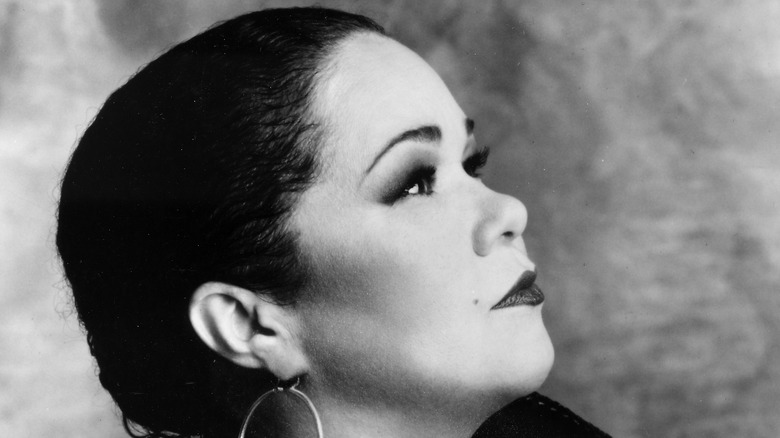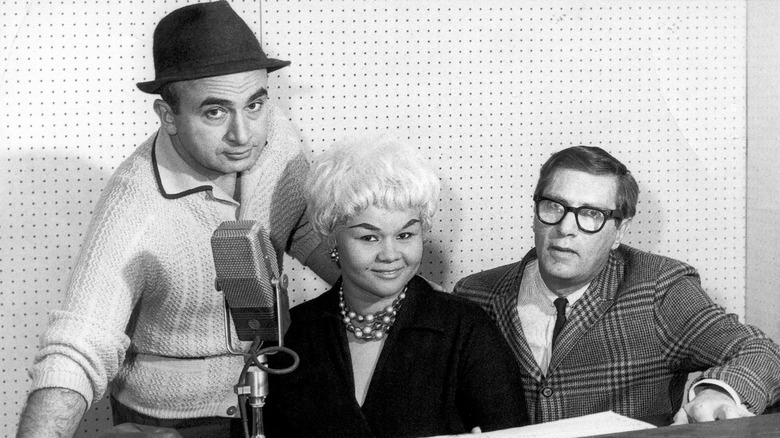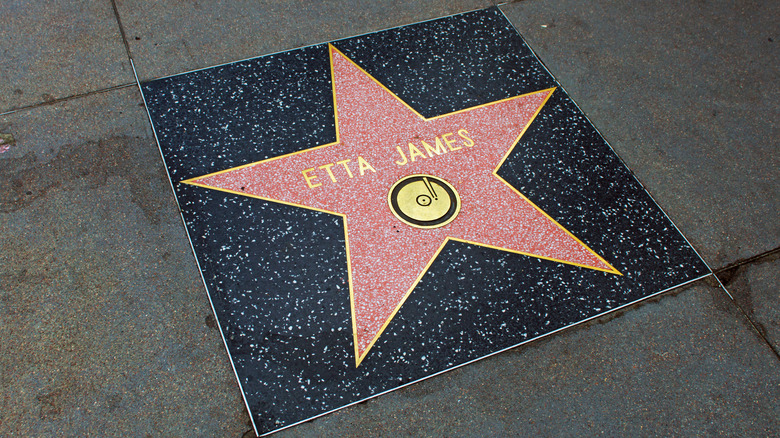The Tragic Real-Life Story Of Etta James
Throughout her life, Etta James' experiences with drug addiction were as well known as her singing. But although she claimed that her singing never seemed to suffer, her drug addiction and the resulting emotional turmoil weren't the only hardships that James was forced to confront and deal with.
James was subjected to physical abuse, exploitation, imprisonment, and health issues over the course of her entire life. And her feelings towards these myriad of tragic experiences sometimes ended up being represented in her music, with more than one song reflecting how she felt about the trauma. In her autobiography "Rage to Survive," she wrote that R&B vocalists are "honest when we sing, that we're incapable of lying in our music."
While her music took her to great heights — several critically acclaimed albums, a Rock & Roll Hall of Fame induction, and three Grammys (and multiple nominations) — her tragedies ultimately left her filled with rage. But it was that rage that kept her going. "Without it, I would have been whipped long ago. With it, I got a lot more songs to sing," she wrote.
Ettta James was abandoned by her mother
Born on January 25, 1938, in Los Angeles, California, Etta James' early childhood was tumultuous because her mother, Dorothy Hawkins, repeatedly kept passing off the responsibility of raising James to other people in her life. Hawkins was only 14 years old when she had James and was subjected to forced sterilization afterward. Hawkins would be out of James' life for months at a time and was so absent from her life that James referred to her as the Mystery Lady and described her as a crazy nightmare in her book.
Even when her mother would reappear and take James, she'd inevitably end up abandoning her daughter once again to go out. When she wasn't back in the mornings, James would "start crying, hungry and afraid that Dorothy would never come back, that no one would ever find me in this god-awful furnished room," James writes in "Rage to Survive."
Because of her mother's repeated abandonment, James told NPR that she went to therapy later in her life for all the negative feelings she developed as a result. She also attributed some of these feelings as the reason she start singing: "And so she did the best for me, because if she had tried to take me with her, she was just a child. What would she have done with me? Would I have been singing today? Would I have been anything, you know?"
Abused and forced to sing
While Dorothy Hawkins was gone from Etta James' life, James would stay with various people like her aunt or foster parents – most notably Lula and Jesse Rogers, called Mama Lu and Sarge by James. While she adored Mama Lu, James repeatedly experienced physical abuse from Sarge.
In "Rage to Survive," James wrote that when she was around 5 years old, Sarge would sometimes come home drunk and force James to sing for his friends. When James refused, Sarge would beat her with his razor strap. "Sleepy, humiliated, mad enough to spit, wearing piss-stained pj's with buttons on the back and feet on the bottom, I'd stand there and sing out some stupid-ass song, hating every second of it," she recalled. James attributed this experience to be the reason why she detested encores.
James received some of her early singing training at St. Paul Baptist Church, but when she started getting noticed and becoming popular for her singing, Sarge started trying to act like her manager. He insisted on controlling every aspect of James' singing education and subsequently withdrew her from St. Paul when she was 10 when he couldn't get his way. James later wrote that this broke her heart, and she became incredibly depressed.
A delinquent teenage runaway
When Etta James was 12 years old, her foster mother Mama Lu died from a stroke after her health had deteriorated for a couple of years. After the funeral, her biological mother Dorothy Hawkins came and took her to San Francisco, California, without even letting James say goodbye to her family or pack up her clothes.
While living in San Francisco, James' mother was once again repeatedly absent from her life and would disappear without even making sure that her daughter had food to eat at home. Because of the lack of parental presence, James often skipped school to hang with a local gang known as the Lucky 20's and would steal costume jewelry with them to resell and buy blues records with the money they made.
James attended several different schools but was repeatedly kicked out. And because James was light-skinned, at school she was subject to harassment from both white and Black children at the school, according to "Explorer Guide to San Francisco and the Bay Area," by Mike Katz and Crispin Kott. She would also harass and assault foreign students at school, breaking one Spanish girl's arm, so much so that she ended up being sent to the Continuation High School for delinquent children. James later recounted that in San Francisco she "grew horns and a tail ... [and turned into] the real street kid. I was kind of like a runaway, but I had a mother," per NPR.
She was appropriated by white artists
During the mid-20th century, record companies frequently exploited Black artists by taking songs of theirs and re-recording them with white pop singers without paying them any additional compensation. This was possible because the record companies took advantage of Black artists who didn't understand copyright law, would use lyrics that hadn't been composed by Black women vocalists, and because performances of songs couldn't be copyrighted, according to "Issues in African American Music," edited by Portia K. Maultsby and Mellonee V. Burnim.
These covers would whitewash the music of Black artists for a white audience, often rewriting the lyrics to remove any hints of sexual innuendos or insinuations and changing the vocal style. Etta James was infuriated by the practice and referred to these songs as Suzy Creamcheese versions.
One of James' songs that was covered in such a way was "The Wallflower (Roll With Me, Henry)." In 1955, Georgia Gibbs recorded a version, renaming it "Dance With Me, Henry," because of the sexual connotations of the word roll. Gibbs' version was incredibly popular and became a No. 1 hit on the top 10 charts. According to "Rage to Survive," James was incredibly furious that "my version went underground and continued to sell while Georgia's whitewash went through the roof."
Etta James became addicted to heroin
By the 1960s, Etta James started using heroin, and it soon became her drug of choice. But the first time that she tried heroin, James ended up overdosing because the heroin was white, unlike the brown heroin she typically saw in Los Angeles. She initially thought it was cocaine.
James' habit became so intense that over the course of one week, she and some friends ended up snorting roughly 150 capsules of heroin themselves. James would also frequently suffer from severe withdrawal symptoms if she was unable to get any drugs. In "Rage to Survive," she wrote that "if I hit a dry period, I'd get sick. Over the long course of my smack addiction, I was sick 80 percent of the time — sick or running the streets looking to cop. If I actually managed to get high the other 20% of the time, I'd be lucky." James ended up prioritizing her heroin habit above all else. Even her singing was just a means to an end. "I found work when I had to. I was essentially working for my habit," she admitted.
But her habit definitely didn't go unnoticed, and James soon built up a reputation for her heroin addiction. Many people were worried about her and often remarked upon her youth when talking about the tragedy of her heroin addiction. Even comparisons made between her and Billie Holiday were centered around their drug use rather than their singing.
A bad influence manager
Etta James managed to maintain a semblance of a career because of her manager John Lewis. And in addition to booking gigs for James, Lewis also supplied James with drugs. But their relationship was tumultuous, and the two sometimes got into intense fights.
During one series of arguments, James yelled at Lewis, "you work for me. I can fire your a**," as per "Rage to Survive." In response, Lewis threatened to send her to prison. Although James thought he was bluffing, Lewis followed through on his threat. He planted heroin in a secret spot in their house and called in a tip to the police, telling them exactly where to find it. She was subsequently charged with buying and possessing heroin. However, the case was thrown out because of the illegal search and seizure.
Although James knew that Lewis had been the one to set her up, they ended up making up and continued to work and get high together until James attempted to get sober from drugs for the first time. And Lewis' bad influence persisted even after James was sober. After she ran into Lewis after coming out of rehab, she ended up relapsing after watching him snort heroin in front of her.
Left in jail by her record company
Despite Etta James' talent, her drug use affected her career. And it wasn't just her heroin addiction either. Her cocaine use was also spiraling, and she had no singing gigs or recording contracts with which to earn money to supply her drug use. James wrote in her autobiography that during the mid-1960s, "my career was in the toilet. People tried to help, but I was hell-bent on getting high," and during this time she only had one song become a hit on the pop and R&B charts, "In the Basement."
Her record company was especially annoyed with her behavior because she would often come to the recording studio high or drunk, unable to stand much less sing. Around the late 1960s, when James was arrested for buying and possessing heroin in Manhattan, New York, her lawyer reached out to the record company to pay her bail because she didn't have any money to do so herself. But the record company refused because they thought that spending some time in jail would be a punishment she could learn from while also getting sober in the meantime, Richard Siracusa writes in "Stranger Than Fiction."
Etta James survived tetanus
When Etta James decided to go to rehab for the first time, her friend and co-founder of Chess Records Leonard Chess booked her into Stern's Convalescent Home in Harvey, Illinois. And because her doctor thought it was better for James to taper off heroin rather than go cold turkey, he arranged for John Lewis to get heroin for James for her first few days in rehab. James continued to use heroin for a few days, but by the fifth day it became clear that withdrawal symptoms weren't the only thing that she had to worry about.
On her fifth day in rehab, James found herself almost completely paralyzed and only able to communicate with her eyes. The doctors diagnosed her with tetanus, which she'd contracted from an infected needle. And her experience became a brutally painful physical ordeal. Her condition was so dire that her doctor tried to slap her to keep her conscious and not seizing. James almost fell into a coma, and at one moment her "body started snapping and curling and bending over backward, going through all kinds of ungodly contortions," per "Rage to Survive."
Taken to Michigan Hospital in Chicago, James managed to survive and in doing so, became "only the second person in the state of Illinois to have survived tetanus." But although James left the hospital and rehab healthy and sober, she relapsed the day she returned to New York from Illinois when she ran into Lewis.
She had many abusive relationships
Although Etta James managed to escape her abusive stepfather Sarge, she continued to experience abuse from various lovers throughout her life. In "Rage to Survive," James attributed the fact that she kept ending up in relationships with abusive men to fear. "The deeper we get into the relationship, the more we realize it's fear that's pushing us, not love. Fear locks us in and holds us prisoner. Sometimes we never escape that prison. Sometimes we do." The fact that she felt sexually satisfied by them also didn't help.
James refered to one of her abusive former lovers as The Pimp. He was incredibly physically and emotionally abusive to James, and her manager John Lewis was so worried about her that he gave her a gun just in case she was attacked. But despite the gun, the Pimp severely beat James on numerous occasions. On one occasion, he struck her repeatedly in the head, resulting in numerous bruises and cuts across her head and face. James ended up pressing charges against the Pimp despite being repeatedly threatened by him, but it's unclear if he was ever convicted.
One of James' songs that references her tragic love life is "I'd Rather Go Blind," recorded in 1968. The song references how she was "blind in my love life, and I was blind in my personal ways. Like the song says, 'I just don't want to be free.'"
Writing bad checks to fund her drug addiction
For years, Etta James would write bad checks for cash in order to fund her drug addiction. But around 1964 in New York City, James and her friend Esther Phillips started a bad-check scheme that involved getting hotels to allow them to write personal checks and then leaving before the checks bounced after already being cashed.
When James was discovered with the checkbook and arrested for writing bad checks, she was imprisoned on Rikers Island for a short period of time. Some time after being released, she traveled to Chicago, Illinois, where she was once again arrested, this time for drug possession as well as writing bad checks. There, she was imprisoned at Cook County jail for four months, which she described in "Rage to Survive" as being like a medieval dungeon.
These weren't the only instances when James was arrested. According to "ROAR," by Bruce Wagner, one time James was arrested by the police while she was singing onstage at Minton's Playhouse in Harlem, New York.
She suffered physical and psychological abuse at rehab
In 1974, after Etta James was charged with writing bad checks, the judge gave her the option of going to prison at the Corona Institute for Women or going to rehab at the Tarzana Psychiatric Hospital outside of Los Angeles, California.
James was at Tarzana for almost two years. But although she knew her time there was necessary to become sober, she experienced horrific physical and psychological abuse there. In addition to verbal abuse from other patients at the hospital, the staff forced her to "wear a diaper and baby bonnet and eat everything out of a baby bottle. Imagine me walking into the main cafeteria wearing this big white diaper with the words 'Poo Poo' scrawled across my ass," James wrote in "Rage to Survive." Other punishments included cleaning the toilets and floors with a toothbrush.
James described this time as her emotional bottom. As a result, in 1974 during her first weeks at the rehab facility, James recorded her song "Feeling Uneasy," which captured the emotions that she was feeling. She describes the song as "a lost song from a low point." But after nearly two years in rehab and being sober, James relapsed with vodka during a Christmas Eve party with the other patients. And rather than be forced to cut her hair and have all her patient privileges revoked, James decided to leave Tarzana.
She was exploited by record companies
Despite the hits that Etta James repeatedly recorded, she was frequently overcharged by the record companies and not paid any royalties, causing her to build up a staggering debt that affected James her entire life. Despite her close relationship with Leonard Chess, she "never made any royalties [from Chess Records.] In fact, I had a debt of about $300,000. And it followed me, it really followed me," she told the Los Angeles Times in 1995.
And it wasn't just economic exploitation. Although Johnny Otis is often credited with helping James start her singing career, he's also been accused of inserting himself as a co-author for James' song "Roll With Me, Henry."
James was frequently taken advantage of by record companies, something that they did to many Black artists at the time, and when her song "The Wallflower (Roll With Me, Henry)" was used in the film Back to the Future, she decided to fight back with a lawyer and assert her right to be compensated for the use of her music in the film. Subsequently, MCA Records agreed to a deal, and this was one of the only times that James managed to push back successfully against exploitation by the music industry.
Drug-induced dementia
Towards the end of her life, Etta James was diagnosed with both Alzheimer's disease and drug-induced dementia. She was diagnosed with Alzheimer's in 2009 and at the beginning of 2010, she entered a rehab facility due to an addiction to painkillers that she developed after taking them for a back injury. The drug-induced dementia was said by her son to have come on as a result of the painkiller addiction. In 2010, she was also hospitalized in Los Angeles after being diagnosed with the bacterial infection MRSA.
In 2009, after Beyoncé sang her song "At Last" at the inauguration of President Barack Obama, James made some disparaging remarks about the singer during a performance at Seattle's Paramound Theatre, saying "that woman he had singing for him, singing my song — she's going to get her a** whupped" (via The Guardian). James also claimed that she couldn't stand Beyoncé. "She has no business up there, singing up there on a big ol' president day, gonna be singing my song that I've been singing forever." Her son, Donto James, later stated publicly that these comments were partly said as a result of her drug-induced dementia.
The dementia followed her through the end of her life. On January 20, 2012, James died from complications from leukemia at Riverside Community Hospital in Riverside, California. She had been diagnosed with chronic leukemia just a year before.
